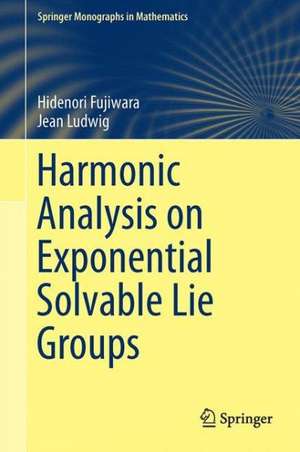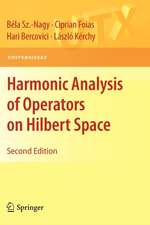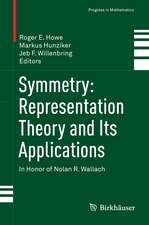Harmonic Analysis on Exponential Solvable Lie Groups: Springer Monographs in Mathematics
Autor Hidenori Fujiwara, Jean Ludwigen Limba Engleză Hardback – 16 dec 2014
The orbit method invented by Kirillov is applied to study basic problems in the analysis on exponential solvable Lie groups. This method tells us that the unitary dual of these groups is realized as the space of their coadjoint orbits. This fact is established using the Mackey theory for induced representations, and that mechanism is explained first. One of the fundamental problems in the representation theory is the irreducible decomposition of induced or restricted representations. Therefore, these decompositions are studied in detail before proceeding to various related problems: the multiplicity formula, Plancherel formulas, intertwining operators, Frobeniusreciprocity, and associated algebras of invariant differential operators.
The main reasoning in the proof of the assertions made here is induction, and for this there are not many tools available. Thus a detailed analysis of the objects listed above is difficult even for exponential solvable Lie groups, and it is often assumed that G is nilpotent. To make the situation clearer and future development possible, many concrete examples are provided. Various topics presented in the nilpotent case still have to be studied for solvable Lie groups that are not nilpotent. They all present interesting and important but difficult problems, however, which should be addressed in the near future. Beyond the exponential case, holomorphically induced representations introduced by Auslander and Kostant are needed, and for that reason they are included in this book.
| Toate formatele și edițiile | Preț | Express |
|---|---|---|
| Paperback (1) | 649.39 lei 43-57 zile | |
| Springer – 2 aug 2016 | 649.39 lei 43-57 zile | |
| Hardback (1) | 655.78 lei 43-57 zile | |
| Springer – 16 dec 2014 | 655.78 lei 43-57 zile |
Din seria Springer Monographs in Mathematics
- 18%
 Preț: 1234.77 lei
Preț: 1234.77 lei - 18%
 Preț: 753.23 lei
Preț: 753.23 lei - 20%
 Preț: 574.70 lei
Preț: 574.70 lei - 24%
 Preț: 740.03 lei
Preț: 740.03 lei - 24%
 Preț: 777.43 lei
Preț: 777.43 lei - 20%
 Preț: 818.29 lei
Preț: 818.29 lei - 18%
 Preț: 969.93 lei
Preț: 969.93 lei - 20%
 Preț: 758.03 lei
Preț: 758.03 lei - 9%
 Preț: 904.20 lei
Preț: 904.20 lei - 15%
 Preț: 607.33 lei
Preț: 607.33 lei - 8%
 Preț: 529.41 lei
Preț: 529.41 lei - 24%
 Preț: 1598.61 lei
Preț: 1598.61 lei -
 Preț: 396.40 lei
Preț: 396.40 lei - 18%
 Preț: 793.14 lei
Preț: 793.14 lei - 15%
 Preț: 650.86 lei
Preț: 650.86 lei - 18%
 Preț: 1236.19 lei
Preț: 1236.19 lei - 15%
 Preț: 499.77 lei
Preț: 499.77 lei -
 Preț: 391.61 lei
Preț: 391.61 lei - 18%
 Preț: 1404.30 lei
Preț: 1404.30 lei - 18%
 Preț: 797.24 lei
Preț: 797.24 lei - 18%
 Preț: 916.25 lei
Preț: 916.25 lei -
 Preț: 397.01 lei
Preț: 397.01 lei - 15%
 Preț: 657.25 lei
Preț: 657.25 lei - 15%
 Preț: 467.79 lei
Preț: 467.79 lei - 15%
 Preț: 648.05 lei
Preț: 648.05 lei -
 Preț: 406.25 lei
Preț: 406.25 lei -
 Preț: 389.88 lei
Preț: 389.88 lei - 15%
 Preț: 649.54 lei
Preț: 649.54 lei - 15%
 Preț: 581.14 lei
Preț: 581.14 lei - 15%
 Preț: 643.48 lei
Preț: 643.48 lei - 15%
 Preț: 647.73 lei
Preț: 647.73 lei - 18%
 Preț: 902.55 lei
Preț: 902.55 lei - 15%
 Preț: 653.33 lei
Preț: 653.33 lei - 18%
 Preț: 901.88 lei
Preț: 901.88 lei - 18%
 Preț: 907.27 lei
Preț: 907.27 lei - 18%
 Preț: 893.53 lei
Preț: 893.53 lei - 15%
 Preț: 659.53 lei
Preț: 659.53 lei - 18%
 Preț: 802.28 lei
Preț: 802.28 lei - 15%
 Preț: 661.32 lei
Preț: 661.32 lei - 15%
 Preț: 646.62 lei
Preț: 646.62 lei -
 Preț: 384.48 lei
Preț: 384.48 lei - 15%
 Preț: 704.36 lei
Preț: 704.36 lei - 18%
 Preț: 1248.20 lei
Preț: 1248.20 lei - 18%
 Preț: 1031.17 lei
Preț: 1031.17 lei -
 Preț: 409.13 lei
Preț: 409.13 lei - 18%
 Preț: 986.01 lei
Preț: 986.01 lei - 15%
 Preț: 640.37 lei
Preț: 640.37 lei - 15%
 Preț: 643.34 lei
Preț: 643.34 lei -
 Preț: 388.72 lei
Preț: 388.72 lei - 18%
 Preț: 965.34 lei
Preț: 965.34 lei
Preț: 655.78 lei
Preț vechi: 771.50 lei
-15% Nou
Puncte Express: 984
Preț estimativ în valută:
125.52€ • 136.39$ • 105.51£
125.52€ • 136.39$ • 105.51£
Carte tipărită la comandă
Livrare economică 21 aprilie-05 mai
Preluare comenzi: 021 569.72.76
Specificații
ISBN-13: 9784431552871
ISBN-10: 4431552871
Pagini: 460
Ilustrații: XI, 465 p.
Dimensiuni: 155 x 235 x 32 mm
Greutate: 0.84 kg
Ediția:2015
Editura: Springer
Colecția Springer
Seria Springer Monographs in Mathematics
Locul publicării:Tokyo, Japan
ISBN-10: 4431552871
Pagini: 460
Ilustrații: XI, 465 p.
Dimensiuni: 155 x 235 x 32 mm
Greutate: 0.84 kg
Ediția:2015
Editura: Springer
Colecția Springer
Seria Springer Monographs in Mathematics
Locul publicării:Tokyo, Japan
Public țintă
ResearchCuprins
1. Preliminaries: Lie groups and Lie algebras 2. Haar measure and group algebra 3. Induced representations 4. Four exponential solvable Lie groups 5. Orbit method 6. Kirillov Theory for nilpotent Lie groups 7. Holomorphically induced representations 8. Irreducible decomposition 9. e-central elements 10. Frobenius reciprocity 11. Plancherel formula 12. Commutativity conjecture: induction case 13. Commutativity conjecture: restriction case.
Recenzii
“The publication of this monograph is obviously animportant event for experts in harmonic analysis and especially for researchersworking in the theory of representations of solvable Lie groups. … theappearance of this book is an important event which will strongly influence thedevelopment of the area.” (Antoni Wawrzyńczyk, Mathematical Reviews, October,2015)
Textul de pe ultima copertă
This book is the first one that brings together recent results on the harmonic analysis of exponential solvable Lie groups. There still are many interesting open problems, and the book contributes to the future progress of this research field. As well, various related topics are presented to motivate young researchers.
The orbit method invented by Kirillov is applied to study basic problems in the analysis on exponential solvable Lie groups. This method tells us that the unitary dual of these groups is realized as the space of their coadjoint orbits. This fact is established using the Mackey theory for induced representations, and that mechanism is explained first. One of the fundamental problems in the representation theory is the irreducible decomposition of induced or restricted representations. Therefore, these decompositions are studied in detail before proceeding to various related problems: the multiplicity formula, Plancherel formulas, intertwining operators, Frobeniusreciprocity, and associated algebras of invariant differential operators.
The main reasoning in the proof of the assertions made here is induction, and for this there are not many tools available. Thus a detailed analysis of the objects listed above is difficult even for exponential solvable Lie groups, and it is often assumed that the group is nilpotent. To make the situation clearer and future development possible, many concrete examples are provided. Various topics presented in the nilpotent case still have to be studied for solvable Lie groups that are not nilpotent. They all present interesting and important but difficult problems, however, which should be addressed in the near future. Beyond the exponential case, holomorphically induced representations introduced by Auslander and Kostant are needed, and for that reason they are included in this book.
The orbit method invented by Kirillov is applied to study basic problems in the analysis on exponential solvable Lie groups. This method tells us that the unitary dual of these groups is realized as the space of their coadjoint orbits. This fact is established using the Mackey theory for induced representations, and that mechanism is explained first. One of the fundamental problems in the representation theory is the irreducible decomposition of induced or restricted representations. Therefore, these decompositions are studied in detail before proceeding to various related problems: the multiplicity formula, Plancherel formulas, intertwining operators, Frobeniusreciprocity, and associated algebras of invariant differential operators.
The main reasoning in the proof of the assertions made here is induction, and for this there are not many tools available. Thus a detailed analysis of the objects listed above is difficult even for exponential solvable Lie groups, and it is often assumed that the group is nilpotent. To make the situation clearer and future development possible, many concrete examples are provided. Various topics presented in the nilpotent case still have to be studied for solvable Lie groups that are not nilpotent. They all present interesting and important but difficult problems, however, which should be addressed in the near future. Beyond the exponential case, holomorphically induced representations introduced by Auslander and Kostant are needed, and for that reason they are included in this book.
Caracteristici
Explains topics that have been actively studied in the non-commutative harmonic analysis of solvable Lie groups Gives the classical standard results with proof related to the so-called orbit method Presents concrete examples that will help provide better understanding and ideas for further progress











